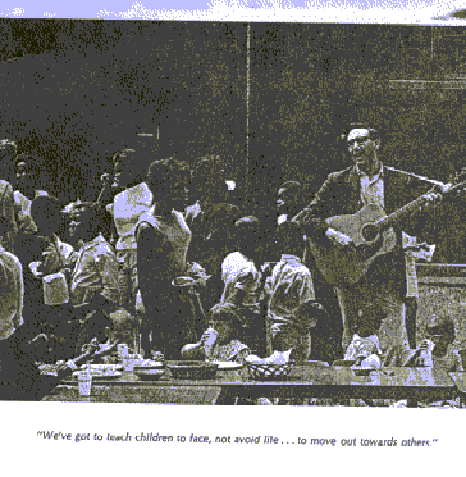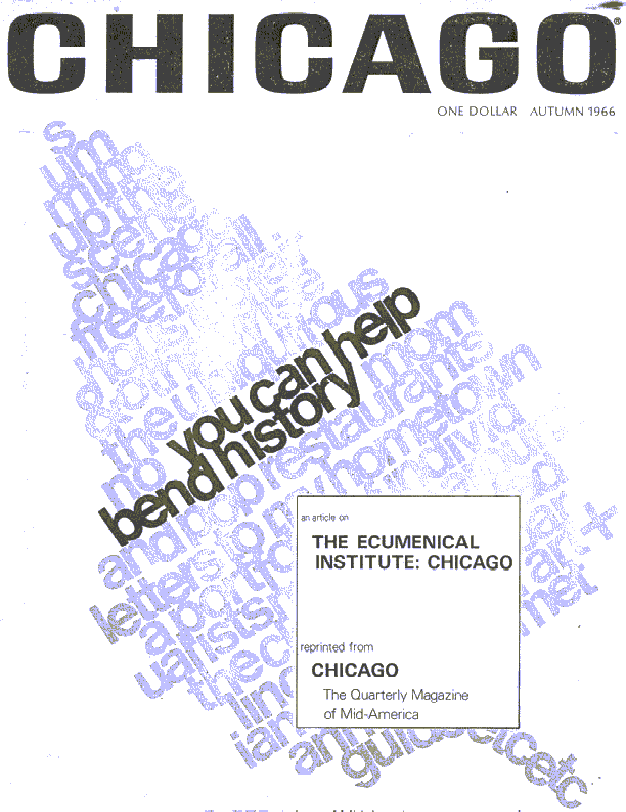
 |
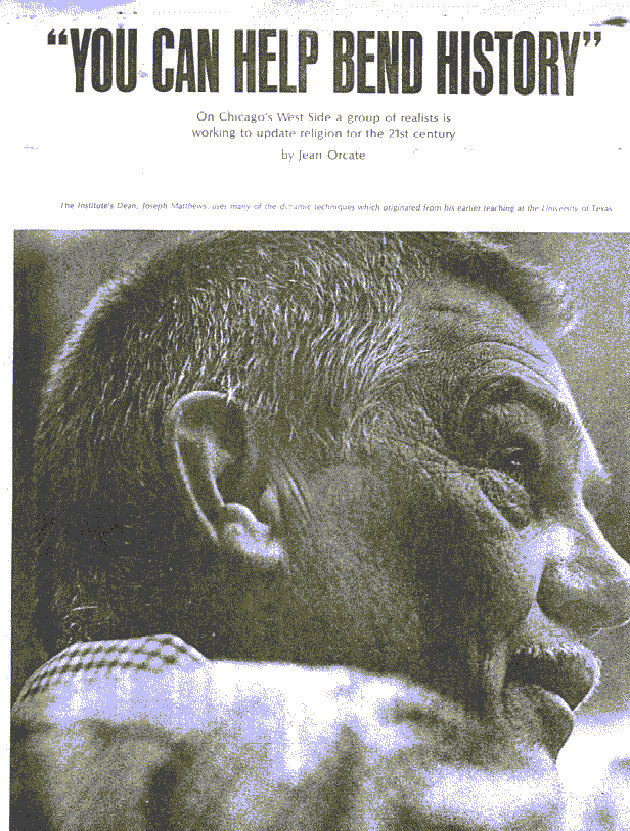 |
The man on the podium brought his fist down
"You know, or ought to if your theological training has been worth a damn, that we haven't a shred of evidence that Christ himself actually lived. All we know for sure is that some 2000 years ago something significant happened, something that moved people and gave them insight into what life was all about. Something that happened to break their illusions. That's the real message, the real meaning of the Messiah: You are a significant and unique and irreplaceable human being. Get out and live your life as it's given to you. Don't wait for someone to help or something to happen, but realize now that the future is open. You can help bend history."
This unique call to action is a welldesigned effort to make both the pompous and the complacent hot around the collar (and a surprising number of the collars belong to Roman Catho-
lics and Jews). Hopefully the visitors listen, learn and return home ready to work. The work? It might be many things, for the Ecumenical Institute believes that the prime challenge of the church today is to create an urban civilization. This involves everyone: the Negro tenant of the slum, the Lake Shore Drive matron, the Loop businessman and the commuter. Perhaps this is merely a modern, desentimentalized way of saying that even today in a complex scientific society men must be their brothers' keepers. How best to fulfill that Biblical injuction is the job at hand.
The Ecumenical Institute, which was set up by the Church Federation in 1957, is located in an old seminary at 3444 West Congress Street. Actually it is neither seminary nor mission society nor settlement house (though it has aspects of all three). "We are," says one of the staff, "a laboratory for the church. You might compare us to the research center of the Ford Motor Company or the Jewel Tea. We are searching for programs and testing projects that will update the church and prepare it for the
21st century. In the past we thought the church was the place where you made gentlemen's agreements to like each other and not to disagree. But anyone with one ounce of raw red human blood knows that's for the birds, and has nothing to do with the church. At the Institute we believe that the old brick and mortar church, with Sunday preaching and all the rest, is on the way out. We must serve human needs. And the deepest needs in our times are in the city. We are in the midst of an urban cultural revolution. If our programs are to be relevant, if the church is to be renewed at grassroots level as a living entity, then it's up to us to find ways to meet the greatest human needs."
The site chosen for this project is a 16block triangle bounded by Congress, Kedzie and Independence Boulevard on Chicago's West Side, the home of 4600 people. In the past five years the area has become 98 percent Negro, and the average age here is 22 years.
There are assets in the community: an elementary school, Marshall High School and an old
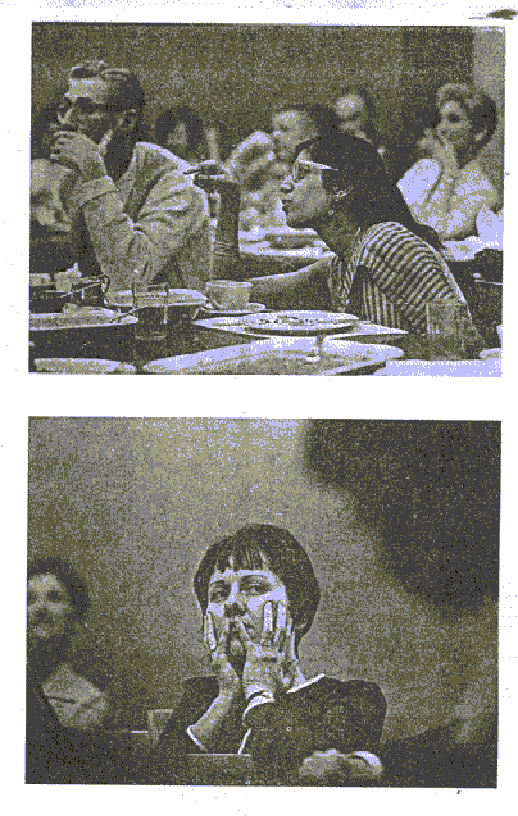
people's home. But there are liabilities too. One minister summed up the greatest community problem when he said: "These people have lost their sense of worth."
:
There is a strong feeling among members of the Institute staff (which now numbers 72 people) that the main work before them is to find ways for these defeated people to help themselves. This means several things. First, no dole. Second, the development of individual initiative and indigenous leadership. Third, a variety
of things must be tried to stamp out the old "nigger image" that so many residents have of themselves. Finally, the staff's goal must be "to workourselvesoutofa job as soon as possible."
Everyone agrees that education is the master key to the future, and most educators agree that the earlier the start and the younger the child, the more hopeful the outcome. So the Ecumenical Institute runs a nursery school. Supported by federal funds under the Of'ice of
Economic Opportunity, this is the only full day program of its kind in the city. Few nursery schools anywhere are as gay as this one, and seldom are 3 and 4yearolds taken so seriously as persons in their own right.
Hopefully one day all the children in the 16block triangle will begin their educations here before moving on to public school. Now there are 50 kids, taught by a staff of eight. Requirement for admission is a guarantee by the parent that he or she will work with the school and attend special classes and help with parties. All mothers are urged to get jobs, for the Institute believes that a selfsupporting parent feels better about herself, and in turn, this brightens the image a child will have of himself.
The staff has taken an eclectic approach to its program, borrowing the ideas from Freud to Frankel.ThestaffFopesthat the nursery school idea as evolved here will be transportable to
any part of the nation.
At the Institute the child is treated as a total being, but the old womb" school philosophy doesn't go, however, for the teachers believe that love is not enough, that responsibility and realism are vital for these children.
"We've got some special jobs to do," an Institute teacher says. "We've got to make these children like themselves, feel a part of a family, a school, a community, a world. But we've also got to teach them to handle life realistically, to deal with things, not to escape from them; to move out toward others."
Outdoors there are swings and giant inner tubes. Indoors, the old seminary rooms have been brightened with paint, festooned with drawings. The dolls are mostly Negro. "We've been accused of discriminating against white dolls." There are countless toy phones, new blocks, and marvelous old hats.
Mealtime is a feast, often the only real meal a child gets during the day. Carrying through on the selfhelp idea, the children set the tables, pass the dishes, clean up, sweep. The saying, or rather, shouting of grace is a joy to the ear and as modern as the Mass in English.
There is a syncopated clapping of hands. Then a chorus of voices shout, "Food is good!" An answering chorus sings out,"Right."Then,"Life is good!" Again, a fullbodied, "Right." Finally, "All is good!" and everyone yells: "It's O.K."
"What do you see outside that follows you around!" a teacher asked a while back, expecting the usual moonandsun sort of answer. Instead several children shouted, "The big Sears sign." In their world it is the big green neon sign on Homan Avenue that marks their goings in and comings out. Using this as a cue, the teachers have set old nursery tunes to modern words. "Twinkle, twinkle, little star" begins, "doom, Voom, astronaut, Are you having funs"
But the preschoolers aren't the only ones in whom the Institute is interested. A number of staff wives are teachers and guidance coun-
PHOTOGRAPHY BY DECLAN HAUN
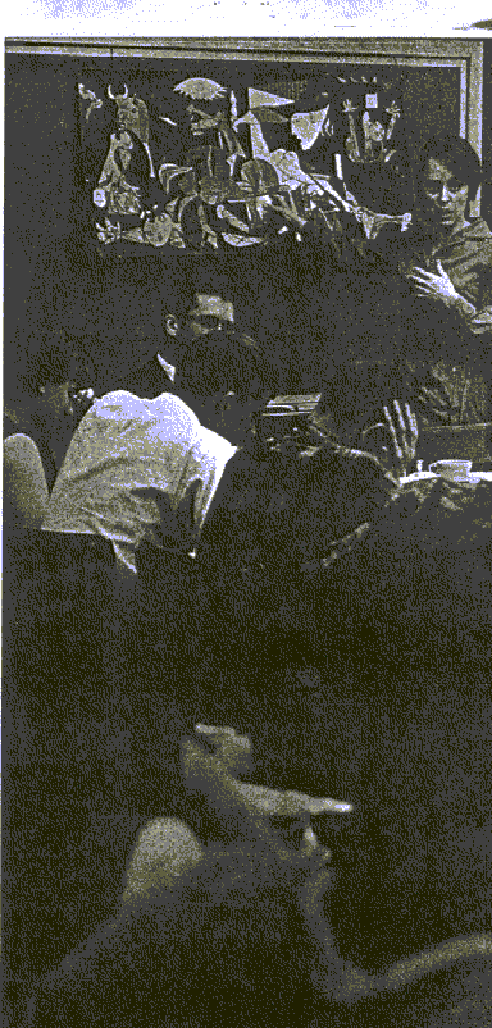
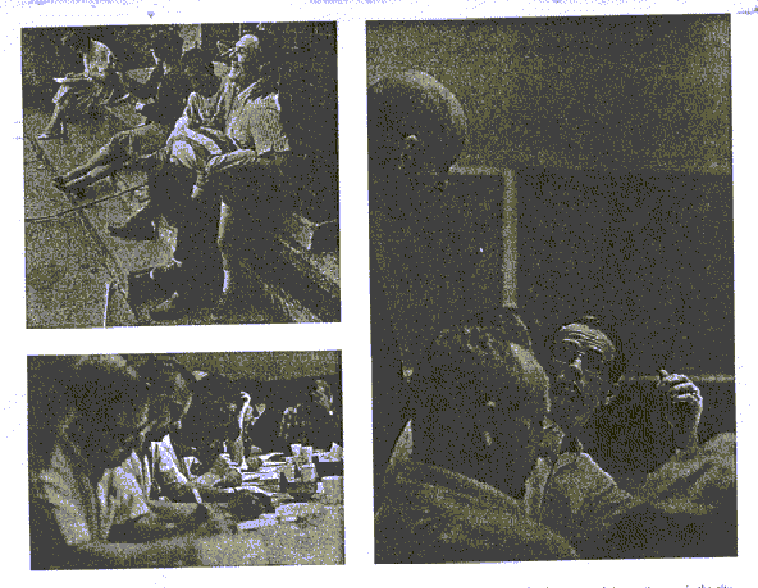
We are seeking programs to update the church for the 21st century. We must serve human needs. And the deepest needs in our time are in the city.
selors and work in the local public schools. After hours they meet as a teachers' cadre and formulate programs to fill a variety of academic needs. One of the most promising of these projects is an effort to locate all Marshall High School seniors who live in the area, see that they get tested, go over their records, counsel them about job possibilities and,where possible, help obtain college scholarships.
In summer the Institute runs an Urban Student House to which come college kids from all over to work in the neighborhood, to tutor and buddy with local high schoolers. When the basement in one building needed paint, 100 suburban kids showed up on the scene and completed the job in 24 hours.
There are programs being planned for neighborhood oldsters: plans for offering credit and real estate advice, consumer and legal counsel. There will be an art center and a drama group will go out on a flatbed truck to present skits to groups who gather on the street. It is expected that this "theater of possibilities" will involve the spectators in discussions of what solutions might be possible for the conflicts presented. Because so many peopIe in the area
have had no academic background, 13week adult education classes are being given to help fill some of their cultural gaps. The staff hopes that enough doctors will become interested so that medical consultants can steer people to the proper clinics, offer birth control information and establish the best of preventive medicine. Housing too is a subject of vital concern. The institute has bought one or two deteriorating houses in the area and hopes to buy more. The plan is to clean them out and then demonstrate how a shell can be refurbished cheaply and well. New York City is being watched with particular interest, for Manhattan housing men reputedly have developed a remodeling technique that can be completed in 48 hours, thus providing a wonderful alternative to the miseries that often result from the displacements of slum clearance.
Much of the inspiration for the various projects came from talks with residents of the Robert Taylor Projects, with jailbirds, with gang members, about what they considered the greatest neighborhood needs. Behind all this work, behind all these plans, run a few elementary principles or what the Institute people
call their "hidden agenda:" Teach that it's a great thing to be a Negro; teach this community and everyone else that restabilizing a neighborhood is everyone's business and to everyone's economic benefit.
Behind the work and plans and principles are the Institute staff. And a surprisingly nonmissionary lot they are. Occasionally someone asks if they consider themselves in the tradition of the great cooperatives of the 19th century (Brook Farm, New Harmony). "But we're not really idealists," they insist. `,We're tough and pragmatic." And it is their earthiness, their living within the vernacular, their concern with the possible, and above all their lighthearted approach that makes them such attractive salesmen for the modern church.
The Institute staff members speak of themselves as the "third order," a term borrowed from Roman Catholicism where the first order is composed of monks, the second of nuns, the third of families. As an order of families they have assumed a discipline, but one based on hardheaded reasoning rather than mystical vows. Since they live in apartments in the seminary and eat communally, they pool the risks
and share the chores. In concrete terms this means that everyone helps with routine cooking, cleaning and office jobs. Even a new bride discovered herself chef on a night when turkey had to be roasted for 40 people.
Some members of the "community" are assigned work within the Institute; some go outside to teach in the schools. Whatever money is earned on the outside is pooled and divided among the families, so much per child and per adult. (Although the Church Federation, several foundations, interested individuals and a number of denominations contribute money to the Institute programs, not one cent trickles into maintaining the staff. Its members believe they must be selfsupporting.) Wisely, communal funds have been set aside for cultural things and for travel. Last year two couples were sent to South America; the year before two others went to South Africa. True, the purpose is for study, for new insights, but there is no frowning on pleasure either.
The "third order" has a philosophy but no set creed, no ritual, no binding rules. Even the Bible is used more as an art form than as a religious prop. "We are 20th century people," the
staff members say. "We are searching for what is relevant for our time. We live in a onestory universe, and we know there is no God upstairs. God is a happening. We believe that the individual finds himself, saves himself, only through identification with the group. "By 'group' we mean the family, the neighborhood, the nation, the world. We believe that living in the fullest sense is the important thing."
Admittedly this isn't always easy. Staying committed, each day renewing one's self, is a large task. Morning services help. So does a low key, 1onpressure attitude.
There is no recruiting of any sort, and yet the staff has grown considerably since Dean Joseph Matthews and his pretty wife arrived from Austin, Texas. The two of them had had a ministerial assignment at the University of Texas and had been working with young people on the campus, trying out dynamic religious ideas. About the time they felt that the real need for action was in an urban setting, they discovered that the Ecumenical Institute in Chicago was looking for a director. That was in 1962, and the two arrived with their three sons, their two cars and six other families. Since then the
Art forms are frequently used to help
the children become more verbal. Mealtime is a feast, often
the
cars have worn out (it is hoped that all staffers eventually will share in cooperative transpor tation), the boys have grown up to becom' Marshall High School students, and the num ber of staff families has tripled, with 12 morr due in the near future.
Word has fanned out that something new anf exciting is going on here. People of all back grounds and races have been coming to the Institute on weekends to study, talk and carr, home the ecumenical message about modern religion. A few of these people became so involved that they picked up their things, sold their homes and bought houses in the West Side area. One of these families that has arrived has nine children.
Dean Matthews says, "We urge potential staffers and these outsiders whom we call our'mobile cadre' to make absolutely sure before they take the step. We don't want dogooders or aeople loaded with guilt. We sat on this property for two years before we made our first move. That's how certain we felt we must be about our own feelings. We had a wonderful lesson in how not to operate the day a man arrived in the neighborhood with 20 turkeys.
only real meal a child gets during the whole day.
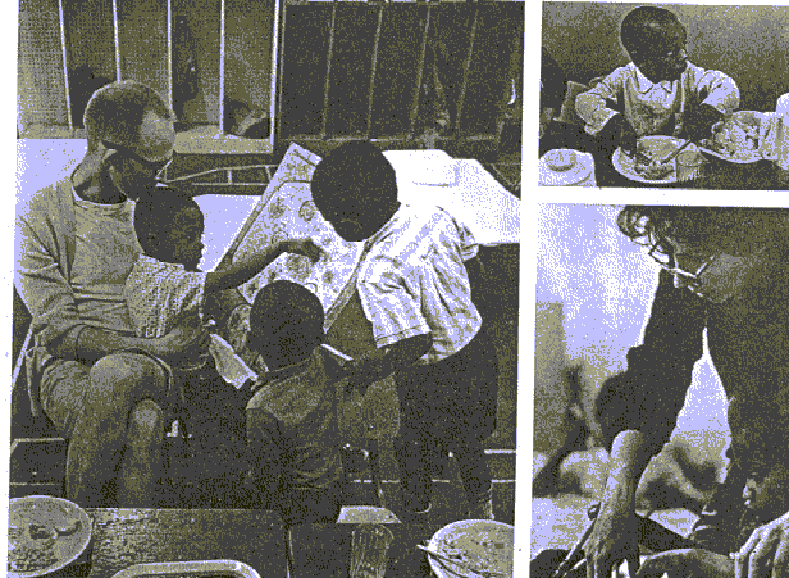
He was feeling nice and righteous inside, but not one person in the neighborhood would accept his bounty. We were delighted about that. It reaffirmed our own feelings that change must come not through a dole but through basic transformations in the structure of society. We must help our neighbors to help themselves. And make no mistake, we've plenty of things to learn from our friends here-their vitality, gaiety, their strength in adversity."
People say O.K. Fine for adults. What about your kids? Right now there are 24 of them, all white, all ages, attending public and parochial schools in the neighborhood. Their parents are toughminded about this. They admit that there have been occasional problems. If the child is not getting enough stimulation or help at school, someone at the Institute pitches in and tutors. The kids have been encouraged to form neighborhood basketball teams, and to include their friends in Institute programs and parties. Not long ago a couple of the high school boys got jumped. Immediately their parents began picking them up after school. Then a gang of nice neighborhood kids heard about the mishap and appointed themselves a bodyguard to escort their friends home. That was that.
What of the future? What has the Institute learned that will be carried into the church of the 21st century? How can urban life be bettered and man's spirit brightened?
It's still early, and staff members are as tentative as they are un-dogmatic. Borrowing terms from Judaism and Mormonism and even communism, they envision tomorrow's church as threefold. There will be the Center or Temple, "perhaps nothing more than a pile of rocks where the great celebrations for all civilization will take place." Then there will be the Stakes or Synagogues. These will be houses in neighborhoods where people gather to worship and study and plan. Finally there will be Guilds, task forces to combat trouble, fight injustice, work for a greater humanness.
The Institute people see religion in the future moving away from the highly organized, structured, ritualistic church. They believe that once again men will turn to an ancient Biblical concept in which each man is priest and rabbi and all men form a priesthood of believers.
But right now there is a neighborhood party to plan. Maybe it will be a swinger like the street dance that was held last year. The police roped off the street. The high school kids provided the jazz bands. The food was barbecued by a neighbor (a retired chef). The price of admission was one chicken. Four hundred birds sizzled. Four hundred human beings did the frug and the watusi. And everyone found life a pretty joyous affair.
Edited with permission of author
Education is the key to the future. The children learn in various ways ... ... free play, inside a clothes closet or outside in the sunshine.
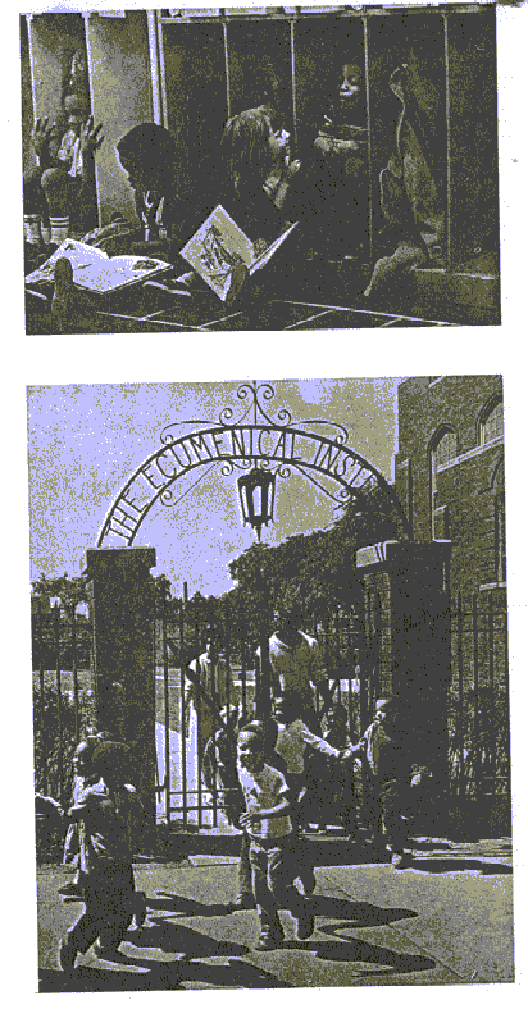

The Quarterly Magazine of MidAmerica
Volume Three, Number Three
CHICAGO Magazine is a project of the Communications Advisory Committee to the Mayor's Committee for the Economic and Cultural Development of Chicago.
CHICAGO Magazine is published by the New Chicago Foundation, a notforprofit organization affiliated with Mayor's Committee for Economic and Cultural Development of Chicago.
Jack W. Whittle, President
George Frerichs, Executive Vice President and Publisher
David L. Watt, Vice PresidentEditorial
Carl Regehr, Vice PresidentGraphic Design
Paul N. Zimmerer, Vice President
Karl Zeisler, Treasurer
Hugo Melvoin, Secretary and Legal Counsel
Committee for Economic and
Cultural Development of Chicago
Richard J. Daley
Mayor
City of Chicago
Executive Board
Chairman: David M. Kennedy,
Chairman, Continental lliinois National Bank
& Trust Company of Chicago
Leo Burnett, Chairman Leo Burnett Company, Inc.
James W. Cook, President lliinois Bell Telephone Co.
William J. Halligan, Sr., Chairman: Hallicrafters Co.
Ben W. Heineman, Chairman Chicago & North Western Ry.
Lawrence A. Kimpton, Vice President
Standard Oil Co. of Indiana
Edward C. Logelin, Vice President U. S. Steel Corp.
William L. McFetridge, President
Chicago Flat Janitors Union Local #1
Herbert V. Prochnow, President
The First National Bank of Chicago
James E. Rutherford
Insurance Consultant
J. Harris Ward, Chairman
Commonwealth Edison Company
3444 Congress Parkway Chicago, Illinois 60624
